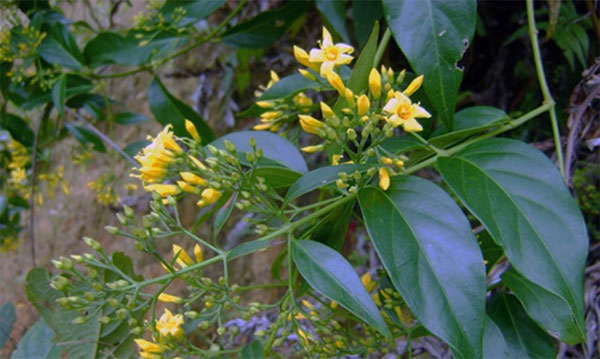The increasing number of suicides in Dien Bien over the last few years has raised alarms among the community in the remote mountainous province.
La ngon, the fatal plant involved in nearly half of all suicide cases in Dien Bien since 2011. Photo Bien phong newspaper
A report from local police recorded a total of 405 suicide attempts with 365 people dieing since 2011 through the end of June 2016. The number increased year by year, and at a concerning rate: the number of people killing themselves last year jumped almost threefold to 94 from just 32 in 2011.
Municipal Criminal Police Division Deputy Chief, Senior Lieutenant Colonel Nguyen Van Hien told Dien Bien newspaper that the suicides happened for various reasons, calling some of them minor. They could be due to low scores at school, spouses’ badmouthing each other or jealousy in romantic affairs.
Vu A So from the Noong U Commune in Dien Bien Dong District, about 52km to the southeast of the province capital Dien Bien Phu City, told of how his nephew barely escaped death after eating the poisonous la ngon, nicknamed the ‘heartbreak grass’.
“When with friends at his house, my nephew’s wife said that he was not a “decent man” in front of the guests. He was so embarrassed and went into the forest to take la ngon to die”, So said.
His wife discovered him in time to save her husband, but attempted suicides for reasons like this were not rare in Noong U where la ngon has become the way out for troubled locals.
In the neighbouring commune of Suoi Lu, a junior high school girl took her own life a few months ago after being scolded by her father for breaking her mobile phone. Her parents found her body inside the adjacent forest, dead after ingesting la ngon.
La ngon, rampant in the northern mountainous regions, is the most poisonous plant in Viet Nam as only three leaves are enough to kill a healthy man in less than an hour. The alkaloids in the plant cause respiratory failure and circulatory collapse.
The police report showed that la ngon appeared in 189 suicide cases in Dien Bien since 2011, or nearly half of the total. Dien Bien Dong District surfaced as the capital of la ngon suicide attempts, accounting for nearly 98 per cent of the cases with 185 suicide attempts.
Over the first eight months of 2016, the district reported 73 cases with 29 people killed by the plant, double the number from the same period last year.
The district health centre deputy director Cao Thi Ly said that many who attempted suicide went into the forest or to fields to eat the grass, making them hard to be found.
“When they were discovered and delivered to the health centre or the communal health stations, it was already too late,” she said. “Most were already dead”.
Noong U People’s Committee Chairman Cu A Cha said that suicide by la ngon were common in ethnic minority communities in the area, disproportionately among Mong people.
Cha believed the reasons for such high a rate of suicide law in poverty, low levels of education and what he called an attitude of undervaluing one’s own life.
However, questions regarding why Mong people had such high rates of suicide – about 85 per cent of suicide attempts in Dien Bien were carried out by Mong locals, according to the police report – compared to a dozen other ethnicities living in similar conditions, remained unanswered. There is yet to be any thorough research into the issue in the region.
To tackle the issue, many proposed destroying all la ngon plants in the area in the short-term, yet Ly believed that the only solution was psychological support for locals.
VNS